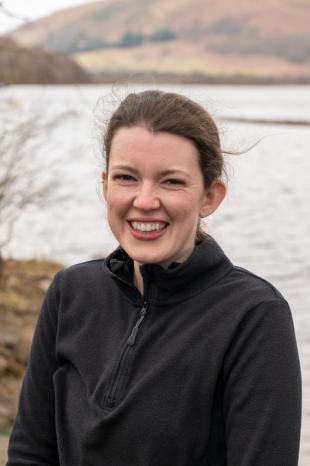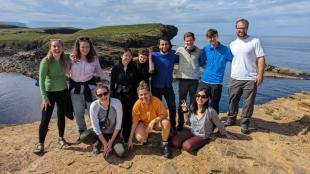A New Direction
Ione came to IDCORE thinking that she would like to work on a sustainability project in offshore wind. However, as happens for many participants in the programme, her ideas changed during the first year as she started to learn more about the sector as a whole. She is now working at FastBlade investigating the potential for manufacturing tidal turbine blades from recyclable materials.
Background
Ione is a Chartered Mechanical Engineer who spent five years in the automotive sector before applying for IDCORE. After graduating from an MEng in Mechanical Design Engineering at the University of Nottingham she joined Jaguar Land Rover where she delivered a number of roles but kept coming back to issues of sustainability and how this could be delivered.
During the COVID pandemic Ione started reflecting on what this meant for her personally and ultimately decided to retrain, applying for IDCORE which had been recommended to her by a friend - a programme that offered high-quality training and the opportunity to undertake research with real-world application in industry. The holistic nature of this training means that alongside insights into the engineering challenges of offshore renewables you also get to study modules on subjects like marine wildlife and gain a deeper understanding of the environment you’re designing for.
FastBlade
Ione’s project is sponsored by FastBlade, a test facility set up by the University of Edinburgh in Rosyth, which offers fatigue testing of tidal turbine blades and other composite structures. She is looking at the suitability of applying recyclable thermoplastic resins in the design of tidal turbine blades – exploring both the quality of the composites produced and their water absorption. In order to replicate the service life of a turbine under water, accelerated test regimes will be applied in which material samples will be immersed in salt water at high temperatures for 18 months.
FastBlade is a first-of-a-kind test facility set up to support a nascent industry that has significant potential in the waters around Scotland. There is significant variability in turbine designs between developers and the facility has been designed to accommodate these variations and provide long-term testing that is energy efficient. Ione’s work is just one element of the offering they are developing for the industry, but she has been given lots of freedom to develop the scope of work which has been liberating as well as challenging.
Benefits of IDCORE
Being in a new test facility in a new industry has created provided a number of opportunities to meet different developers and to work with the university to bridge the gap between industry and academia. Ione has even met Princess Anne and, through the network she has developed, received an invitation from MayGen to visit their tidal turbine installation.
Ione was looking for a challenge when she came to IDCORE and she hasn’t been disappointed. Returning to a learning environment after so many years in industry was tough, but the support, knowledge and sharing of experience within the cohort made this so much easier than it could have been. The colleagues on the course have become good friends – a diverse group and yet one with similar interests, ambitions and values – people who ask the questions that you haven’t.








